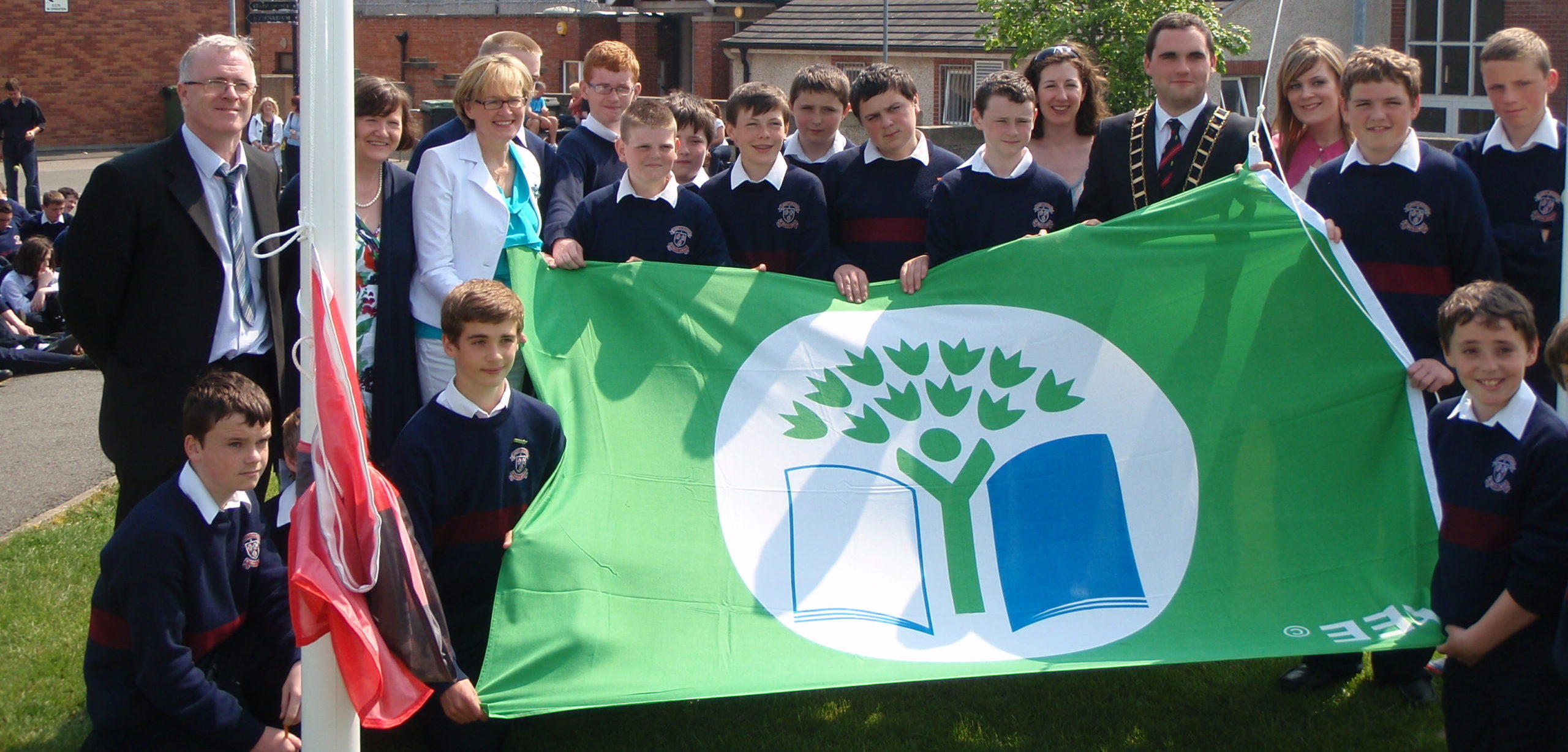

St. Marys Diocesan School has been involved in the Green Schools programme since 2009. Green schools are a student-led initiative which aims to educate schools and wider communities to the importance of environmental issues and reducing our footprint on the planet.
The programme follows seven steps: 1) form a committee, 2) conduct an environmental audit, 3) devise an action plan, 4) inform and involve the community, 5) monitor and evaluate your actions, 6) link your theme to the curriculum and 7) create a green code for your theme.
A committee was established of volunteers, interested students who wanted to lead environmental change in the school and wider community. Committee members come from all year groups with the junior school representing the majority.
In 2010 we set along the 2-year journey to achieve the first flag for litter & waste. A limited amount of recycling had been taking place in the school prior to beginning this initiative but we hoped to raise the bar and get the wider school community involved. Recycling went from 0% to 30% with the introduction of green bins in the school yard, recycling bins in classrooms and staffroom, a tuck shop where students could purchase copies, pencils, pens made from reused materials and a greater awareness of what can and can’t be recycled. We also spread the word of litter management to the wider community by participating in the annual National Spring clean event and the Drogheda Litter Prevention programme. We were delighted to be awarded the first flag in 2012 and had the pleasure to invite Mairead Mc Guinness (MEP) to raise the flag for us.
While maintaining the Litter and Waste flag we set about introducing the next flag for energy in 2012. With this flag it was important for us to ensure that the school was being as efficient as possible with their energy usage. An energy audit was conducted on our gas and electricity supplies and possible savings were highlighted, posters were placed in every classroom to remind teachers to turn off lights, computers etc when out of the room. Windows and doors were audited to see whether new fixtures and fittings were needed to help reduce energy loss through them. The committee also established an energy squad whereby members would check at break and days end if lights were left on. Reoccurring offenders were approached.
The school community got involved in this flag by calculating their carbon footprint & being reminded of Earth Hour every March. By the end of the 7 steps of the Energy Flag we were able to decrease our energy bills by 15% and were delighted to be awarded the 2nd flag in 2014. On a sunny day in September, Ged Nash, TD raised the flag for us.
The third flag is for Water. In this flag we set about trying to make the school community more aware of their water usage and wastage. The committee held presentations in front of the Junior school to educate them in the importance of water, its uses and need for water conservation. One of our committee members, Brendan Ngandu became a Water Ambassador, whereby he set about spreading the message of ‘Think before you flush’ (what can and cannot be flushed down the toilet) and the Microbeads challenge (tiny microscopic beads found in lots of our cleansing products that go undetected in our water treatment plants and are consumed by us and fish): encouraging people to purchase products without ‘poly’ chemicals in them. This message is frightfully necessary in today’s world were the levels of plastic in our oceans at a dangerously high level, impacting on our ocean wildlife. In Sept 2016, as the school was celebrated its 50th year we invited one of the first pupils of the school, Connie to raise the water flag for us. That was a proud and historic day.
The fourth flag is for travel. With this flag the committee strove hard to change students’ habits of how they travel to school. ‘Walk on Wednesday’ days were established with spot prizes given to students who participated. Class groups took part in a travel challenge with teachers monitoring those who travelled to school in a sustainable manner (by foot, bike, bus, public transport, carpool). Students were also made aware of the health benefits to incorporating some physical exercise into their school day. The committee applied for a bike shelter through An Taisce & were delighted to have one constructed on the school grounds. Students cycling to school has increased 10%. However, the committee are still raising awareness of the importance of bike safety and wearing their helmets when cycling. Walkability/ cyclability audits were conducted, letters to the local county council were written to increase the signage around the school to make it safer for walkers/ cyclists.
In May 2018 we raised our 4th flag for Travel. Mary Leech, an athlete who represented Ireland and won silver in the Masters European championships raised the flag for us and spoke heroically of the importance of exercise not just for your physical health but also for your mental health wellbeing.
Currently this school, while maintaining its 4 flags already achieved is working on the 5th flag for Biodiversity. We are very excited about this flag as the school is creating a vegetable garden with the agricultural science students.
The Green schools’ journey has empowered the students involved and hopes to educate and involve the school community to be more active, get involved or change a habit that can be for the better for many generations to come.